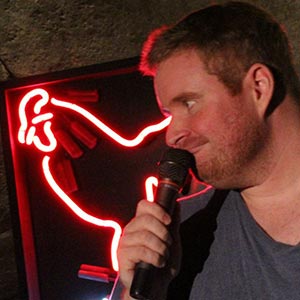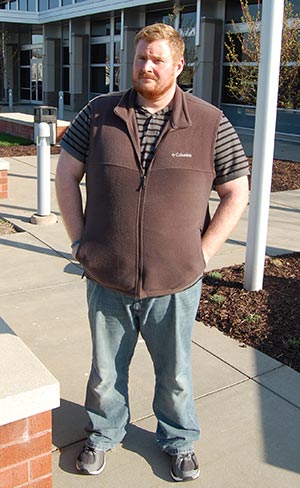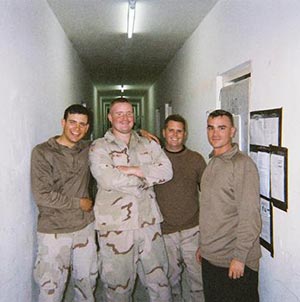He was on a mission in Fallujah, Iraq, when a civilian was injured. He and another soldier were trying to save his life.
“I feel like it’s my fault, because I should have done one thing differently … but the guy died in front of me,” said Shawn Shelnutt, 32, in an interview with Catholic Herald myFaith March 27. To learn more about, or to book, Catholic comedian and motivational speaker Shawn Shelnutt, visit his website shawnshelnutt.com.(Submitted photo courtesy Shawn Shelnutt)
To learn more about, or to book, Catholic comedian and motivational speaker Shawn Shelnutt, visit his website shawnshelnutt.com.(Submitted photo courtesy Shawn Shelnutt)
Though he had attended Catholic school from second to eighth grade in New Jersey, before his family moved to Milwaukee, Shelnutt had fallen away from his Catholic faith in his teens, never getting confirmed. He was pretty much agnostic when he joined the Army at age 19, less than a week after Sept. 11, 2001, and there was even a point when he considered himself an atheist.
But in that moment, when Shelnutt knew that man was dying, he leaned in and whispered, “As-Salaam-Alaikum,” an Arabic phrase someone had taught him meaning, “Peace be upon you.”
“It wasn’t like I believed, but it was like maybe that’s what he needs to hear before he (died). …” said Shelnutt, the oldest of three children.
He watched the man take his last breath, and just a moment after, Shelnutt felt something.
“At that point, I didn’t know what it was. I just kind of pushed it off, and then it wasn’t until the service for my dad when I felt it,” Shelnutt said of the same feeling he experienced when his uncle, a priest in South Carolina, presided at a memorial service for Shelnutt’s father, who died Dec. 1, 2012. “… suddenly, I was like, ‘Oh my gosh, this is God … this was part of his whole plan. He wanted me to know he was with me, that he was never gone even though I rejected his love, that he had never abandoned me’ … It’s a direct link to why I came back to the church.”
 Shawn Shelnutt, 32, recently returned to his Catholic faith and is transitioning into being a full-time comedian and motivational speaker. He will be confirmed Catholic at Old St. Mary Church in Milwaukee, May 24. (Catholic Herald photo by Ricardo Torres)Coming back to the church would also help him find clarity in his career of comedy and motivational speaking; he wants to use his experiences as a source of inspiration and motivation for people.
Shawn Shelnutt, 32, recently returned to his Catholic faith and is transitioning into being a full-time comedian and motivational speaker. He will be confirmed Catholic at Old St. Mary Church in Milwaukee, May 24. (Catholic Herald photo by Ricardo Torres)Coming back to the church would also help him find clarity in his career of comedy and motivational speaking; he wants to use his experiences as a source of inspiration and motivation for people.
“If every day I can make someone laugh or smile, then I’ve done good that day,” he said. “It’s not about getting hundreds of people to laugh. Mother Teresa, I think, said if you can’t feed 100 people, then just feed one.”
Devastated by loss of ‘battle buddies’
But Shelnutt would reach rock bottom before returning to the church.
He did more than 300 combat missions during the 13 months he was in Iraq, beginning in September of 2003, serving as a machine gunner, lead vehicle driver for a quick reaction force, night-shift radio watch, personal security detachment and on patrol missions.
He lost a lot of friends, or “battle buddies” as he called them, and witnessed a lot of loss.
On Nov. 8, 2003, Shelnutt had been on an early morning radio watch. He was one of the last people to talk to Army Staff Sgt. Mark D. Vasquez. Vasquez was upset that morning because the satellite phone wasn’t charged, so he couldn’t make his 10-minute phone call to his wife and kids – they got one per week. Shelnutt told him he’d be sure to charge it so he could call them later. Vasquez also commented on the coffee not being made.
“I heard you make the best coffee in the world so I didn’t want to mess up and not make the best. …” Shelnutt recalled jokingly apologizing to Vasquez. “We joked and laughed a little bit and then I listened to him; he vented to me about the phone.”
Two hours later, a sergeant came into the room to tell them Vasquez and another friend were dead. Shelnutt said that day was a 9/11 type of event for him.
“I’ll never forget that — that sometimes the littlest things can make a huge difference,” he said.
That, and other losses, would stick with him and affect how he lives today.
‘Why couldn’t that have been me?’
Shelnutt volunteered for missions for 90-some days in a row, meaning there were 50 days other guys didn’t have to go. He returned from them.  Shawn Shelnutt, second from the left, stands with some of the “great guys” he met in a civil affairs unit in Fallujah, Iraq, in 2003. He served as their machine gunner for four months. (Submitted photo courtesy Shawn Shelnutt)
Shawn Shelnutt, second from the left, stands with some of the “great guys” he met in a civil affairs unit in Fallujah, Iraq, in 2003. He served as their machine gunner for four months. (Submitted photo courtesy Shawn Shelnutt)
When Army Sgt. Daniel Michael Shepherd, who had just gone home to his wife and witnessed the birth of his first child, volunteered to go on a mission for another soldier who wasn’t feeling well, he never returned.
“I didn’t really have anybody and I always remember thinking like, ‘Man, why couldn’t that have been me?’” Shelnutt said. “And now I realize that God has plans for me and it’s a good thing that any of the times I was suicidal or in Iraq that I could have gotten killed that I didn’t, I think I have a lot to offer the people around me and that’s all I really can do … learning that I can live my life first for God because I need to do what he wants me to do, what he has set out for me to be the person that he created me to be is the best thing I can do. By doing that, I can live my life the best I can for the people that I lost, the people that I knew that I loved, that I cared about, that are no longer with me. If I do the best I can and I affect the most people possible, it’ll make the sacrifices that they all made and the time that they could have had on this earth that much more worth the sacrifice.”
While he planned to serve the full four years, Shelnutt was honorably discharged because he developed a problem.
“Some guys drink, some guys end up doing drugs, I actually got addicted to food; I had gained 180 pounds in a year,” Shelnutt said, explaining it was the reason the first sergeant told him he wouldn’t be able to re-enlist.
“He said, ‘I can get you out early if you promise you’ll go to college.’ I wouldn’t have gone to college if he hadn’t said that,” said Shelnutt, who earned his bachelor’s degree in psychology from UW-Milwaukee. He’s currently attending Cardinal Stritch University for his master’s in clinical psychology, and is his thesis away from earning it.
14 years of bad choices, depression
He said he went through 14 years of bad choices and severe depression, was suicidal and hospitalized three times. He was in bad relationship after bad relationship. He failed college and had to write a letter to get back in, as he struggled with severe Post Traumatic Stress Disorder and depression.
He was almost evicted from his home. He got a repossession notice for his car and went through about 13 jobs in just over a year.
“I isolated; I was barely making it, and then I’d basically get into a really unhealthy romantic relationship … ” he said. “I barely remember the years 2005 to 2009, about five years – like I don’t remember Christmas Day, I don’t remember any holidays, I don’t remember my birthday. … I have very, very, very few memories from those years, whereas in the last couple years, I can recall much more.”
He attributes the improvement to taking a different medication at the VA, and going to therapy and groups.
“If someone asked me how I feel the majority of my life has been, I would say not happy, which sucks, but I believe that where I’m at now and headed is going to be amazing,” Shelnutt said. “I feel like God was just waiting for me to come back. It was up to me.”
He said when he rejected God in his life, the suffering began.
“The misery in my life started when I started rejecting God,” he said, “and the happiness and love I feel to the extent I feel it began to manifest when I re-accepted God.”
When Shelnutt’s father died, and he felt the Holy Spirit again as he had when that civilian died in front of him, it changed his world and he began to seek where it was leading him.
Invite to Cor Jesu is life-changing
That led him to attending Cor Jesu – a weekly gathering at St. Robert Church, Shorewood, featuring eucharistic adoration, reconciliation, praise and worship, thanks to a friend’s invitation last year. After going regularly, he went to confession – something he hadn’t done in a long time.
“That’s when things really started to happen,” he said.
Shelnutt had expected a lecture about being away from the church, but the priest instead welcomed him home.
“I was working on everything and the thing is I was adjusting my life,” he said of last May through December. “I lived a certain way for 12, 13 years and suddenly this lightning struck my heart and it was like I need to change. It was tough. It wasn’t easy. There were things that I was used to, habits that I had that I now am like, ‘Oh my gosh, I’ve been living this way for 15 to 20 years and I’m not supposed to be living this way. I have to rethink the way I see people, the way I see the world. I have to do what God wants me to do.’”
As he was trying to figure everything out, Shelnutt said he told the priest in confession last Dec. 17 that while he has been going to church and doing all of these things, something was still missing.
He took the priest’s suggestion to focus on the crucifix at Mass, and to tell God he was giving him his life – that he wanted to be what God wanted him to be. That’s when everything clicked for Shelnutt.
“I realized that I truly believe that God tasked me with leaving to understand the secular world and knowing that something would bring me back eventually so that I can help people stay in the church so they don’t forsake themselves by leaving God’s grace and to help bring people back in,” he said. “I mean, I really believe that’s my calling and I think I’m supposed to do that through comedy and motivational speaking, and I really think that everything, kind of working with youth and mental health, social services – all that stuff was a culmination like leading me up to being able to understand people.”
Stand-up comic goes clean
Shelnutt, who worked in the mental health profession for four years, is in his fourth year of doing stand-up comedy, and is transitioning into being a motivational speaker and comedian full time. He has gigs booked about once a month, and will be giving a motivational talk to Marquette University students on humor and depression at the end of the month.
He recently changed his comedy repertoire and stopped telling “dirty” jokes.
“I decided, ‘OK, I’m going to go 100 percent clean, or try to at least. …’” he said. And as soon as he got rid of that material, he said he “instantly started thinking of things.” He has been looking to the Bible for inspiration – like the Creation story in Genesis, playing off of the names that Adam gives to the animals, starting with names like “giraffe” and “dolphin,” only to lose enthusiasm 7,000 animals later, spouting out things like “bat,” “rat,” and “I don’t know, your name spelled backwards – dog.”
He even has jokes he can tell kids.
Tori Pohl, 26, a parishioner at St. Mary, Menomonee Falls, who met Shelnutt through work last June, watched a bunch of Disney movies with him, a project he embarked upon earlier this year as a prompt for his comedy act.
“Most comedians don’t necessarily have the cleanest of jokes, so he’s been working really, really hard lately to bring in as much genuinely funny, but appropriate-for-all-ages jokes into his repertoire, so that’s been really cool to kind of see that growth in him, which was part of the Disney movie project,” she said.
Shelnutt said cleaning up his act was easy.
“Once I started doing that, I actually got my first feature set for a comedy club, so it was like once I gave myself to God, all these good things started happening,” he said.
The night he told someone he wasn’t using “dirty” material anymore, and cut out jokes with sexual innuendos, was the same night he got a text about an opportunity to perform for a benefit show. He wouldn’t get paid, but if he did well, they would book him.
Confirmation saint with sense of humor
“I went and I did really well and they booked me and, sure enough, it’s the weekend I get confirmed,” Shelnutt said of his confirmation — May 24 at Old St. Mary Church in Milwaukee being the same weekend as his first full feature weekend, May 21-23 at Comedy Café.
He also found a confirmation saint to whom he could relate — St. Lawrence.
“He was burned alive, and even while he was being burned, he yelled to his, to the people that were doing it, ‘You might want to turn me over now, I’m done on this side,’” he said.
John Hennen, 33, of Wauwatosa, who met Shelnutt during their freshman year of high school at Rufus King, Milwaukee, described him as one of the most outgoing and sensitive people he’s ever met.
“It’s actually funny, because I think (it’s) those two things – him being so outgoing and him being so sensitive that make him such a good comedian,” said Hennen, who has seen Shelnutt perform about 10 times, including his first show. “And he’s got a lot of empathy, so he’s able to relate to people a lot.”
He said Shelnutt stands out from other comedians in the way he’s positive and just wants everyone to have a good time.
“I mean there’s some comedians who their whole shtick is, ‘Oh, I’m angry at the world and like screw you guys,’ and all this, and it’s kind of refreshing that he’s able to get up there and have that happy attitude. … It kind of makes everyone else just want to have a good time, ” Hennen said.
He also said Shelnutt is dedicated to improving himself, while he has seen other comedians re-use material.
“Shawn is constantly evolving and learning and understanding, not just what people want … (what) the people he’s talking to find funny, but also what he, what kind of comedy he wants to tell and he’s been kind of evolving his style, and that’s been cool to see,” he said.
Faith brings changes to his comedy
In addition to witnessing Shelnutt’s comedy changing, Hennen has noticed how Shelnutt has changed in light of finding his faith – something that concerned him at first.
“He went from call it agnostic, call it whatever you want, it was just not really caring or believing anything to, ‘Yep, this is what I believe in.’ …” he said. “We’ve had a lot of long talks about it, about why and what changed and, because I was just concerned as his friend that this is the right move for him, and I mean, it’s been positive all across the board. He’s more content.”
Looking back at where Shelnutt was to where he is now – from high school to the Army and everything that has happened since – is almost “surreal,” to Hennen.
“Out of everybody I know, he has gone from like the total depths of like call it despair … and being in such a horrible way with every facet of your life that you can imagine, to like having a master’s degree just about, and being the stand-up comedy guy and having this faith …” Hennen said. “It’s just kind of amazing to see.”
